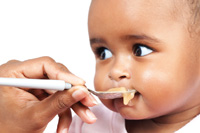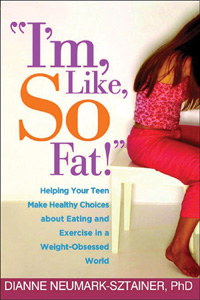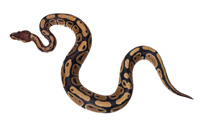 Solid evidence
Solid evidence
If you bottle-feed your baby, don’t start solid foods too early — that’s the advice of researchers who’ve just found a link between early solids and obesity. Their study finds that bottle-fed babies who start solid foods before the age of 4 months are six times more likely to be obese at the age of 3 years! Researchers didn’t find a similar link between solid-food introduction and obesity for breastfed babies. The American Academy of Pediatrics recommends that babies start on solid foods between 4 and 6 months of age.
Snooze to lose
Another fascinating fact about childhood obesity: Kids who are allowed to sleep in on weekends are less likely to be obese. That may not be surprising, since getting too little sleep is linked to weight gain in people of all ages. Researchers say the best thing for kids is a regular sleep schedule every day, but “catch-up” sleep on weekends and holidays tends to mitigate the adverse effects of irregular sleep during the week.
 Weight not
Weight not
We’re psyched to report that excellent friend of ParentMap Dianne Neumark-Sztainer, Ph.D. is coming to our area for a talk based on her book, “I’m, Like, SO Fat!": Helping Your Teen Make Healthy Choices about Eating and Exercise in a Weight-Obsessed World. The book’s title says it all! March 27, 10:30 a.m. at the Stroum Jewish Community Center on Mercer Island. Tickets are $20 at parentmap.com/fat.
Game on!
If you’ve got a gamer in the house, you already know: The next wave in video gaming, the Nintendo 3DS, will be released later this month. And you may have heard that Nintendo is warning that children younger than 6 should not use 3-D products, because the devices might damage vision. But the American Academy of Ophthalmology (AAO) disagrees, saying there is no evidence that 3-D digital products can hurt vision in kids. According to the AAO, “The development of normal 3-D vision in children is stimulated as they use their eyes in day-to-day social and natural environments, and this development is largely complete by age three years.”
 Snakes on the brain
Snakes on the brain
According to new research, we’re not born afraid of spiders or snakes, but learn those fears very early in life. Scientists studying how fear works found that the more potentially dangerous a thing is, the more quickly we learn to fear it. They say we have built-in biases to detect things like spiders and snakes. But when has a fear gone too far? Read our article about phobias on page 44.
Marital bliss
Marriage makes men nicer, according to a study published in the Archives of General Psychiatry. Researchers studied 289 pairs of male twins and found that the men who were married engaged in much lower levels of antisocial behavior (like getting into a brawl) than their unmarried twins. In the study, the twins who were less aggressive and more empathetic had a better chance of getting married in the first place, but those civilizing effects increased after marriage. Researchers say one explanation for this may be that men learn relationship skills from their wives.
Marriage Rx
Learn a few marriage skills yourself at our upcoming lecture by John Gottman, Ph.D.! This year’s line-up features Gottman (twice!), Laura Kastner, Ph.D., Michael Riera, Ph.D., best-selling author Christine Carter and others. Tickets are going fast; visit parentmap.com/lectures and see page 37 for more information.
—Kristen Russell


